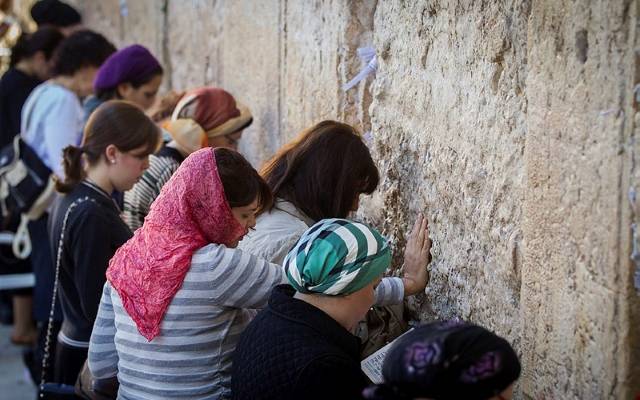Judaism embraces women and respects them. While it might appear that men and women aren’t equal in Judaism, that is not true.
By Rabbi Ari Enkin, Rabbinic Director, United with Israel
In the Torah portion of “Pinchas” (Numbers 25:10–30:1), we read about the episode known as “The Daughters of Tzelophchad.”
Tzelophchad, a mysterious individual, died and left behind five daughters andno sons. As such, the daughters asked to inherit their father’s land in the absence of male heirs.
Moses, unsure how to rule, turns to God, who then declared the girls’ claim as justified. Not only did they inherit their father’s land; they set the precedent for all future women to have inheritance rights.
In this article we will learn more about this story and the roles and rights of women in Judaism.
Tzelophchad had five daughters – Machlah, Noa (no relation to the guy with the boat), Hoglah, Milcah, and Tirtzah, and they lived during the last of the 40 years of wandering in the desert, just before the Jews were to enter the Promised Land. We are told that these sisters were extremely smart, wise, and equal to each other in stature. This is why the order in which their names appear in the Torah often changes, lest we be led to believe that one was superior to the others.
Tzelophchad died mysteriously (indeed, the name “Tzelophchad” means “dark, or scared, shadow”) in the desert, likely due to a sin that he committed. Since he had no sons, his daughters argued that they should be given inheritance rights, including their father’s land allocation in the Land of Israel. They pleaded their case to Moses, Elazar the priest, the tribal leaders, and eventually to the entire nation.
As mentioned, Moses didn’t know what to do. He didn’t know what the law would be in such a case. That’s right, even Moses didn’t know everything. So he went to a Higher Authority for advice. God said that the sisters were correct in their claim and that they should be given their father’s inheritance.
With this trailblazing ruling, the Torah then goes on to list some of the laws of inheritance, such as in the event that there are no sons, the daughter (or daughters) inherit. And if there are no children at all, the inheritance goes to the deceased’s brothers. And if there are no brothers, the inheritance goes to the nearest relative.
The rabbis expanded these laws as needed for contemporary applications. For example, rabbis such as Maimonides have ruled that sons and their descendants are the heirs of an individual. If there are no sons, it is the daughters or their descendants who inherit. From this point on, inheritance goes to the deceased’s father, if alive, and if not, to the deceased’s brothers and half brothers and their descendants. If this too is not possible, inheritance goes to the deceased’s sisters, then the grandfather, and so on.
Dizzy yet? Yes, inheritance law is literally one of the most complicated areas of Jewish law. There are legal loopholes to allow all children, both sons and daughters, to inherit equally, but that is beyond the scope of this article.
Women With Major Roles and Influence
True, women are not mentioned in the Bible nearly as often as men, however, they appear in major roles with major influence. Take for example the Matriarchs – Sarah, Rebecca, Rachel, and Leah. We have Miriam the prophetess, Devorah the Judge, and Queen Esther. The women of the bible shine in their righteousness, wisdom, and leadership. Without them, the Bible “couldn’t have happened.”
Women are exempt from performing time-bound mitzvot (Torah commandments),which is why they do not don tefillin (phylacteries) or a tallit (prayer shawl). Nor are they truly obligated to hear the shofar (ram’s horn) on Rosh Hashana, as these are all examples of mitzvot that must be performed at a certain time of day. They are, however, required to observe all the “negative” mitzvot of the Torah, such as, “Thou shall not steal,” “Thou shall not commit adultery,” “Thou shall not eat pork,” and so on.
While at one point Talmud study for women was shunned, many rabbis nowadays from both the modern and the ultra-orthodox movements allow it, if not outright encourage it. In fact, already in the 12th century, Maimonides permitted women to study Torah even though there was no precedent. The 19th -entury saintly Rabbi Yisrael Meir Kagan wrote, “It would appear that all these laws against Torah study for women were intended for earlier generations and the ancestral tradition was very strong…but nowadays it is a great mitzvah to teach women Torah so that they will internalize our sacred faith.” The 20th-century Rabbi Joseph Soloveitchik took it a step further when he said that all religious Jews not merely should, but must, teach their female children Talmud.
As we have seen, and this is but a drop in the ocean, Judaism embraces women and respects them. While it might appear that men and women aren’t equal in Judaism, that is not true. Judaism doesn’t believe in equality in the Western sense. We believe in complementary differences. We believe in two parts needed equally to make a whole. We believe in one gender being responsible for A,B,C, and the other gender for X,Y,Z.
From Tzelophchad’s daughters to the lovely ladies reading this now…you are a vital component of Judaism and Jewish life!
For more insights by Rabbi Enkin on this week’s Torah portion, click on the links below.
https://unitedwithisrael.org/living-torah-to-make-a-brighter-future-make-time-for-family/
https://unitedwithisrael.org/living-torah-never-be-afraid-to-stand-up-for-the-truth/
